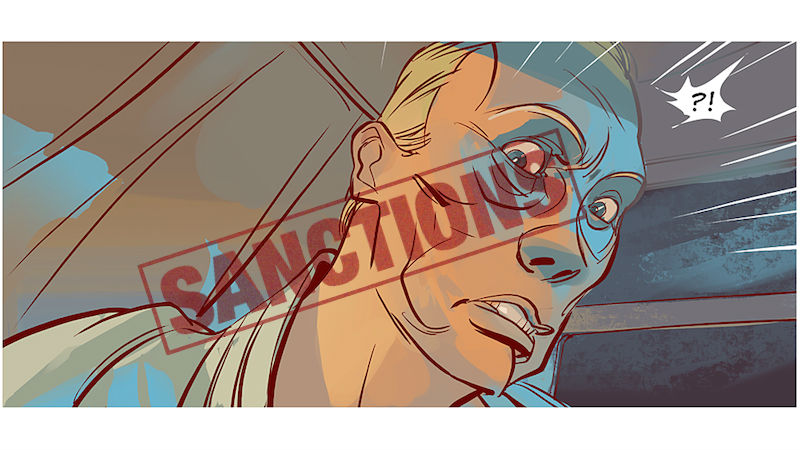
Western sanctions have hit Putin hard, but are they tough enough? Images mixed by Tetyana Lokot. Original image by superputin.ru is licensed under CC BY 3.0.
The West has hit Russia with the toughest sanctions yet, signaling that it is finally getting serious about Russia’s continued support for separatists in eastern Ukraine. Though the Obama administration unilaterally implemented a round of sanctions a day before the downing of Malaysian Flight 17, it was the aviation disaster that prodded the Europeans into tougher action. The new round of tougher sanctions targets individuals in government and business, banking, technology, engineering, and weapons, but they still fall short of hitting Russia where it really hurts: the gas industry. This isn’t surprising.
EU countries are wholly dependent on Russia for a third of their gas; they are reluctant to inflict pain on themselves. EU sanctions do, however, affect Russia's future gas exploration by sanctioning technology for gas exploration and extraction. Though sanctions are one of the only instruments the West can use to deter Russia, some experts contend that they are still relatively weak compared to those placed on, say, Iran, North Korea, and Syria. More, they argue, must be done.
The sanctions will likely do little to deter Vladimir Putin. Some even claim that they will allow him to further consolidate his power, as he plays up Russia’s need to decouple from the West and develop its national industry. This is indeed the view of LJ user spydell, who writes that the sanctions are ultimately good for Russia because they will renationalize the elite, develop national industry, and force Russia to diversify its economy. Spydell concludes:
Санкции положительны во всех отношениях и являются мощнейшей дозой стимуляторов для экономики. В краткосрочной перспективе пертурбации возможны, но в долгосрочной перспективе очевиден явно положительный эффект. В некотором роде США и ЕС в последние 4 месяца сделали для России больше полезного, чем российские чиновники за последние несколько лет.
Sanctions are positive in all respects and are a powerful dose of stimulant for the economy. In the short term, disturbances are possible, but in the long term a positive effect is clearly obvious. In some ways, in the last 4 months the U.S. and the EU have done more good for Russia than Russian officials have over the past few years.
Not everyone agrees. Some on the RuNet think that the real harm will be inflicted upon the Russian public, not the elites in power. The opposition leader Boris Nemtsov wrote on Facebook:
Общий долг российских банков и компаний 650 млрд долларов. Заплатить в течении года надо 100. Золотовалютные резервы 470 млрд. Заплатят, но ставки по кредитам и инфляция вырастут, а рубль ослабнет.
Зарплаты и пенсии будут заморожены, уровень жизни медленно, но верно начнет падать. За безумную войну заплатит народ, который пока еще рукоплещет “вождю”.
Russian banks and companies’ total debt is $650 billion. They need to pay $100 billion back this year. There’s $470 billion in gold reserves. They will pay, but interest rates and inflation will rise, and the ruble will weaken.
Salaries and pensions will be frozen and the standard of living will slowly but surely begin to fall. The people who still applaud the “leader” will pay for this insane war.
Similarly, Alexey Navalny tweeted:
Смысл выступления Обамы “Мы сделаем их слабую экономику ещё слабее”. Короче, Путин занимается фигнёй, а нам платить за это всё.
— Alexey Navalny (@navalny) July 29, 2014
The meaning of Obama’s speech is “We will make their weak economy weaker.” In short, Putin engages in nonsense and we will pay for it all.
Some took the opportunity to joke. @korobkov tweeted, referring to the Soviet megaprojects of the Yamal and Baikal-Amur railways,
Ударным трудом на Ямале и БАМе Ответим на санкции Бараку Обаме!
— Максимальный ретвит! (@korobkov) July 30, 2014
We will answer Barak Obama’s sanctions with shock work in Yamal and BAM!
The fact that Sberbank, one of Russia’s largest banks, didn’t make it to the sanctions list (although, as we know, Sberbank was included in the most recent round of sectoral sanctions, the most severe ones yet – GV) prompted Olga Romanova to comment on Facebook,
ВТБ, Банк Москвы, Россельхозбанк в списке санкций. Сбера нет. Беспокоюсь за Грефа Г.О. – не объявят ли его теперь пятой колонной?
VTB, the Bank of Moscow, and the Russian Agricultural Bank are on the sanctions list. Sberbank isn’t. I worry for German Gref [the head of Sberbank]. Will they now proclaim him as a fifth column?
Boris Nemtsov, however, took Sberbank’s absence more seriously, and felt that it was a prudent action. He explained on Facebook:
Почему американцы ввели санкции против ВТБ и Россельхозбанка, а против Сбера – нет? Причины две: санкции против Сбера, где хранят свои сбережения 70% российских вкладчиков, означают наезд на сбережения миллионов граждан страны. Такие санкции позволят пропагандистам из Кремля все свалить на Америку и настраивают уже через кошельки народ против Запада.
У ВТБ и Россельхоза вкладчиков значительно меньше, а возглавляют их чекист Костин и сын чекиста Патрушева Дмитрий. Это санкции болезненные для Путина и не смертельные для граждан.
Короче, храните деньги в сберегательной кассе!
Why did the Americans impose sanctions on VTB and Russian Agricultural Bank and not against Sberbank? For two reasons: sanctions against Sberbank, where 70 percent of Russian depositors keep their savings, meant hitting the savings of millions of citizens. Such sanctions would allow the Kremlin propagandists to blame everything on America and incite the people against the West through their wallets.
VTB and Rosselkhozbank have fewer depositors, and their heads are the chekist [Andrei] Kostin and son of a chekist, Dmitry Patrushev. These sanctions are painful for Putin and not fatal to citizens. In short, keep your money in a state savings bank!
Nemtsov’s view that the sanctions will be “painful to Putin” aside, judging from some of the responses, RuNet users don’t appear hopeful that the West’s sanctions will change anything. Putin won’t be swayed, and the Russian people will ultimately suffer.







